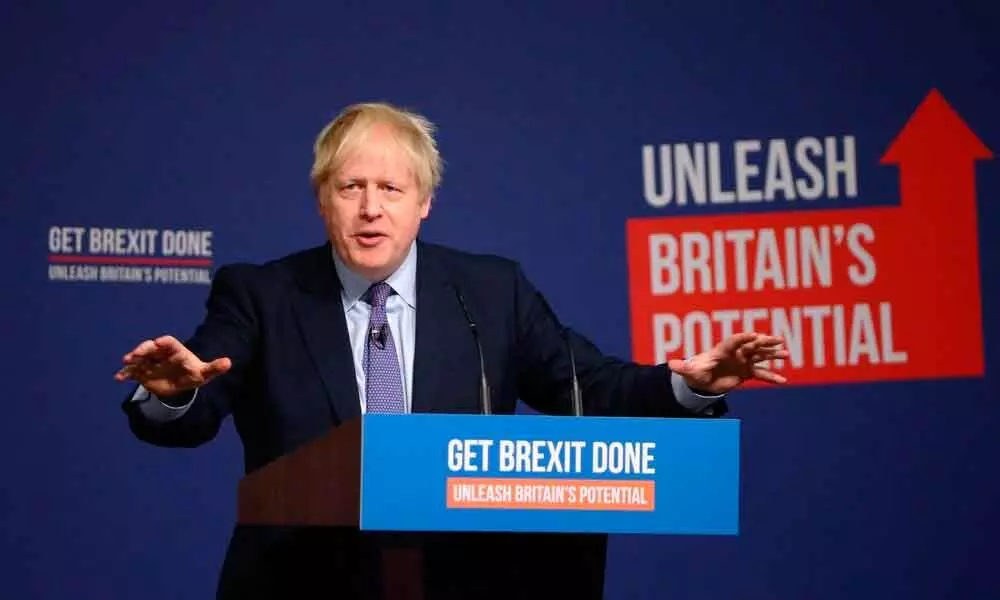British rule means free will, not free lunch
Only a handful of people are privy to what’s going on inside the “tunnel” of European Union-UK trade talks.
image for illustrative purpose

Only a handful of people are privy to what's going on inside the "tunnel" of European Union-UK trade talks. But the softening of political rhetoric since Sunday suggests negotiators have achieved a breakthrough of sorts on the question of maintaining a level playing field on post-Brexit trade rules, one of the three big things dividing the two sides. This has implications not only for the prospects of a deal but for how Britain makes laws after Brexit.
The EU said back in 2017 that preferential access to its single market would depend on the UK remaining aligned with its environmental, social and labor-market standards, as well as with its state aid rules. Brussels sees the need for this level playing field as existential. The bloc doesn't want the British getting a competitive advantage through looser regulations, or other EU members thinking that they can also abandon the obligations of membership while keeping the benefits.
But the EU went too far, setting the bar impossibly high. It didn't just want Britain to maintain existing standards. It wanted guarantees that the country would remain aligned with EU rules, even when they change. Boris Johnson colorfully labeled this the "ratchet clause."
Brussels also wanted the European Court of Justice (the bete noire of Brexiters) to be the final interpreter of EU rules and for any penalties for breaches to apply automatically. These penalties could be applied in any area of trade.
The principle of cross-retaliation is well-established under World Trade Organization rules (it's why tariffs on handbags and ketchup are caught up in the Airbus-Boeing dispute). But Switzerland can attest to the EU's willingness to deploy the weapon after Brussels cut off its access to EU stock markets because of a disagreement over immigration and other trade terms.
Michel Barnier, the EU's chief Brexit negotiator, has argued all along that Britain isn't like other trading partners because it's starting out on equivalent terms to the rest of the EU on everything from product standards to labor regulations, so the bloc needs to make sure London doesn't just undercut its future rule changes.
There's something to this. "There is a regulatory divergence in normal trade deals that provides natural protection for each market," explains Eric White, a trade lawyer with Herbert Smith Freehills in Brussels.
Still, both sides know that eventually they'll have to arrive at an agreement - whether it's now or later. The longer it takes, the higher the cost to businesses and consumers, and the harder it will be to rebuild trust.
Setting such a high bar gives Barnier room to compromise without retreating from the EU's central objective of trading access for sticking by EU rules. Britain has already conceded the principle of "non-regression" (it won't undercut the existing rules), which has elicited grumbles from some Tory lawmakers who see the ability to diverge as Brexit's sine qua non.
But Britain looks to have won concessions, too. That may be worth the price for Conservatives who don't want to own the chaos of a no-deal Brexit.
The disagreement is narrower than many think, notes Sam Lowe at the Center for European Reform. The two sides are no longer discussing whether the EU can withdraw favorable treatment, and UK compliance wouldn't now be subject to the ECJ. That may pave the way to an agreement, as long as the febrile issue of fishing rights can be fudged or kicked down the road.
If it sticks, the emerging compromise would let Johnson claim that Britain has freed itself from the jurisdiction of European courts and taken back control over its laws. If the UK does diverge from EU rules in future, it may pay a penalty in the form of new tariffs or other trade friction. But as Lowe notes, "It becomes a choice. The UK still has the sovereign decision to do whatever it wants." Weighed against the "no-deal" prospect of immediate tariffs on January 1, possible future penalties seem a lesser evil.
And yet, it also demonstrates the practical limits of Johnson's cherished "sovereignty." Imagine a British government that had to choose at some point between adopting the UK equivalent of an EU regulation or accepting some loss of EU market access. If Brussels decided, for example, to limit executive pay in a way that discouraged companies from headquartering in the UK, that might be explosive.
These are problems for future administrations, however, which may explain why a deal looks more possible today. In practical terms, nothing much would change on January 1 if agreement is reached. On environmental law, the UK has moved to increase protections already; if anything, it could force the EU to raise its standards.(Bloomberg)

